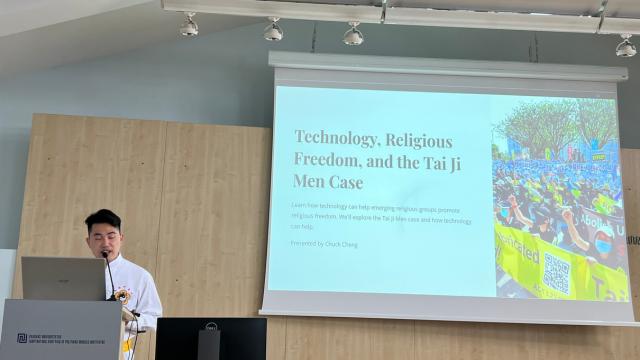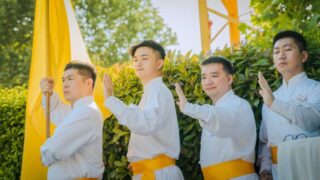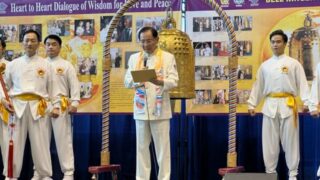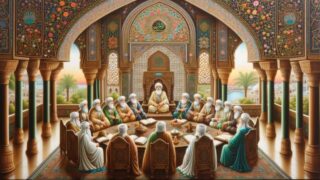Technology can be a powerful tool to promote freedom of belief, spreading the awareness of injustices such as those perpetrated against Tai Ji Men.
by Cheng Hsuan-Ming*
*A paper presented at the CESNUR 2023 international conference, Vilnius, Lithuania, June 21, 2023.


I am a senior manager in the technology industry field, and also a disciple of Dr. Hong Tao-Tze, the Shifu (Grand Master) of Tai Ji Men. I have followed his teachings for more than thirty years. In the technology industry, embracing emerging ideas and innovative technologies helps us keep up with the times. As a disciple of an ancient qigong and martial arts menpai (similar to a school), my process of inner growth includes self-awareness, experiencing the world, and embracing humanity.
On my journey of learning with Dr. Hong, I was fortunate to experience a process of growth and enlightenment, and personally understand the challenges that new religions and spiritual groups face in terms of freedom of religion, belief, and thought. Today, I would like to share with you some views on freedom of belief and new religions.
Freedom of religion, belief, and thought is an important indicator of the diversity of our society. Not only does it affect human dignity, but also involves social fairness and justice, as well as world peace and sustainable development. However, new religions often face special challenges in the pursuit of freedom of thought and belief.


Freedom of belief is a basic human right and also corresponds to the basic dignity of being human. Not only does it give everyone the right to choose what religion to believe in but also includes the right to freely practice our own beliefs without hindering the freedom of others. This freedom is especially important in a multicultural society because it encourages us to accept and respect different beliefs and ideas.
In history, and internationally, we can find several guidelines for upholding freedom of belief. For example, the First Amendment of the United States Constitution explicitly protects freedom of belief, ensuring that all have the right to choose and practice their beliefs—or non-beliefs. Other examples are the United Nations’ Universal Declaration of Human Rights and the Two Covenants, which also affirm that freedom of belief is a basic human right.
However, despite clear international guidelines on freedom of belief, some new spiritual groups and emerging religions still face many challenges. One reason for this is that the internal cohesion of these faith groups may be seen by the governments as an independent and uncontrollable public opinion force, causing them unease and often leading to suppression. A deeper reason is that new spiritual groups and emerging religions, due to their being different from traditional religions and to the low societal awareness of them arising from their relative lateness in development, often become the target of societal misunderstandings and discrimination.
To ensure that all can freely enjoy their beliefs, we need to continue to affirm that, regardless of whether these beliefs are mainstream or emerging, they should be treated equally, respected, and protected.
I would like to share the challenges and dilemmas faced by spiritual groups and emerging religions through personal experience. I am a disciple of Tai Ji Men. For a long time, our Shifu and us have self-funded ourselves to travel to 101 countries around the world, sharing love, peace, and the concept of conscience with the world. It is worth mentioning that on July 25, 2019, the United Nations passed a resolution proposed by the Kingdom of Bahrain on “Promoting a Culture of Peace with Love and Conscience,” and set April 5 to be celebrated every year as the International Day of Conscience. My master, Dr. Hong, was one of the promoters of these major events.
I joined Tai Ji Men in 1992, I was still a child then. My parents went to practice qigong, and I played in the hall, where my senior brothers and sisters would take turns taking care of me. From that time on, I understood that Tai Ji Men is a good place to learn joy, positive thinking, body training, and spiritual cultivation.


However, in 1996, Tai Ji Men was persecuted in Taiwan by the government within the framework of a broader religious crackdown. The details of this case will be discussed in another paper in this session.
Here, I want to emphasize two aspects of the case, which perhaps are discussed less often. The first is that my master and his wife committed no criminal acts and were not guilty of tax evasion. However, because of the criminal and the tax cases, my master was restricted from leaving the country four times, totaling 2,233 days, and his wife was restricted twice, totaling 782 days. They also had their assets unlawfully frozen and seized. The Universal Declaration of Human Rights by the United Nations states that everyone has the right to freedom of movement and of residence within the borders of each state. In a democratic and free country where many people come and go for business, education, or international exchange activities, people’s freedom of movement and entry and exit not only brings economic vitality to the country but also promotes multicultural exchanges internationally.
However, due to Prosecutor Hou Kuan-Jen’s unlawful prosecution and the National Taxation Bureau’s unlawful taxation, leading to improper restrictions on travel, my master and his wife’s freedom to enter and leave the country was stripped away. This severely infringed on my master’s freedom of religion, right to promote culture, and right to personal movement, and also infringed on the rights of Tai Ji Men disciples to participate in cultural life. It even led to my master and his wife being unable to visit their children studying abroad, so that their right to family reunion was also stripped away.


Taiwan has incorporated the United Nations Two Covenants into domestic law and held the first national human rights report review in 2013. International human rights experts pointed out in the conclusive opinion of the review, item 68: “Restricting people from leaving the country for tax reasons does not comply with the restrictions of Article 12, Paragraph 3 of the ICCPR.” The Ministry of Finance should have held a hearing to amend the law. However, the Ministry of Finance has not amended the law in accordance with the spirit of the ICCPR. In fact, even now, the Ministry of Finance and the National Tax Bureau continue to restrict people from leaving the country under the name of taxation. The Two Covenants have become mere decorations.
The second aspect of the case I would like to mention concerns the Swiss Mountain Villa. Before the case occurred, my master had purchased a building named Swiss Mountain Villa, originally for disciples to practice and train in. It has a beautiful European castle style and is nestled in a charming natural scenery. However, this dreamy Swiss cottage has now become a desolate ruin due to the protraction of the case. The prosecutor, the National Tax Bureau, and the Administrative Enforcement Agency have all used various methods to seal, freeze, and prevent the disposal of the Swiss Mountain Villa. Even though the Supreme Court confirmed in 2007 that Tai Ji Men was innocent and owed no taxes, the National Tax Bureau and the Administrative Enforcement Agency continued to forcefully dispose of the Villa. Only 23 years, 5 months, and 7 days after the case occurred, was the Swiss Mountain Villa returned, after the seal was canceled in 2020, but it was already dilapidated to the point of being beyond repair.


In this wrongful case that should never have existed in the first place, against the damage suffered by Tai Ji Men disciples and the time they lost, the officials involved have not admitted their mistakes, have provided no compensation, and have not taken responsibility for what happened. They even got promotions during this period, with the initiator of the case, Prosecutor Hou, even being promoted to Deputy Director of the Ministry of Justice’s Agency Against Corruption, and then again to Director of the Ministry of Justice’s Forensic Research Institute, which is frustrating and outrageous.
As a network technology practitioner, I firmly believe that in this era, technology is a powerful force that can serve as an important tool to promote religious freedom.
It connects the world, breaks down national and racial barriers, and allows us to understand more easily and respect different beliefs.
We can use technology to educate the public and eliminate misunderstandings and prejudices against new religions and spiritual practice groups. For example, we can create and share educational content about religious doctrines, practices, and values, breaking stereotypes with facts and knowledge, promoting understanding and respect for different beliefs.
Next, we can use technology to help oppressed religious groups speak out. Social media, blogs, websites, and other platforms provide us with channels to express our opinions and share true stories. We can establish online communities for faith groups, allowing voices that are ignored or suppressed to be heard and fight for their rights to fairness and freedom.
Furthermore, we can engage in cross-national and cross-belief dialogues through technology. This helps to enhance consensus and promote unity, peace, and respect among religions, gathering greater strength to jointly push for the right to freedom of belief.
This is a basic human right that deserves respect and protection. We should work together, using the power of technology, to realize freedom of belief in every corner of the world, allowing everyone to freely choose and practice their beliefs without any form of discrimination or persecution.
Let’s work together and strive to combine the power of technology and religious freedom to build a free and equal society.









